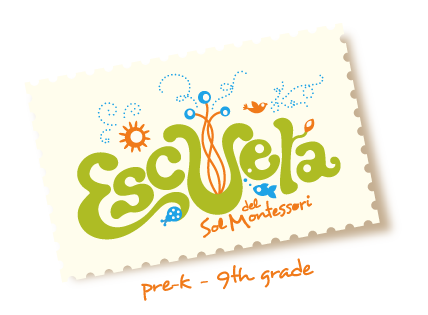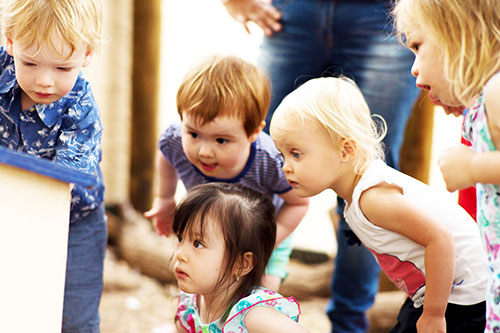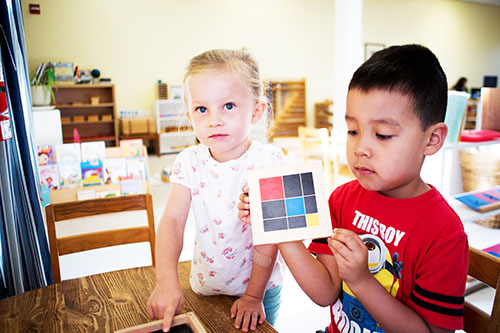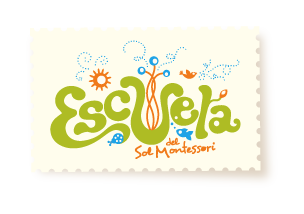Whether working with very young children, elementary students, adolescents, or even adults, foundational principles of the Montessori approach to lifelong learning influence how we prepare our classrooms, structure lessons, foster classroom culture, and guide choices. One such principle has three overlapping components: Care of Self, Care of Others, Care of the Environment. Take a moment to think of some of the ways you care for yourself, others, and the environment, whether that’s your home, neighborhood, or planet! What comes to mind? In the upcoming series we’ll explore and offer insights about how these spheres grow in sophistication as your children do.
Throughout all Planes of Development, activities related to Care of Self help children gain independence. This important work also supports neurological development that lays a foundation for coordination, concentration, abstract thinking, and executive function. And children really love this work! It builds the knowledge that caring for yourself throughout your life is valuable and important.
In Early Childhood, Care of Self can be both Practical Life activities using materials, such as dressing frames, and also real-life practice. For toddlers, setting up an environment that supports independence allows children to practice toileting, dressing, drinking, and eatingon their own. In the Primary prepared environment, materials in the classroom allow children to practice skills such as snapping, buttoning, lacing and tying, which all require concentration and fine-motor control. Children also practice Care of Self while feeding themselves, washing their hands, using the bathroom, and dressing themselves to go outside. Guides support children practicing Care of Self by allowing them to complete tasks, like putting on their own shoes, no matter how long it takes. Allowing young children to do things on their own encourages independence, helps them see what they’re capable of, and communicates trust from the adult – I know you can do this!
When children move up to Elementary, Practical Life work becomes integrated into the daily life of the classroom. In Jr. El, students consciously practice organization by keeping their work and supplies tidy, setting goals, making work plans, and building an awareness of time. They also gain more independence, being responsible for walking down the hall to use the restroom or visiting other classes to borrow resources. Responsibilities, of course, take practice. Jr. El students are learning to navigate community: sharing space and resources, identifying their feelings, and advocating for their needs to their peers and Guides.
By Senior Elementary, Care of Self is no longer a discreet work choice, but rather is something you do and express as part of a community. The physical and emotional components have grown in sophistication and nuance. Long before Sr. El students approach puberty and adolescence, Guides have conversations about understanding and caring for one’s own physical, mental, and emotional well-being. They reinforce the basics, like handwashing and movement breaks, but also begin to explore deeper subjects as the students’ autonomy grows. Even something as simple as snack becomes lessons about listening to your body – what to eat, when, and how much to consume; considering the social component and blood sugar; how what you eat makes you feel and act.
Sr. El students also start identifying and being conscious of how their emotions affect themselves and others. The Guides support students as they begin to delve into emotional maturation, helping them identify their mental, emotional and social needs, and then supporting them as they explore ways to express and fulfill those needs. Students in Senior Elementary begin Our Whole Lives (O.W.L.s), a developmentally appropriate component of the curriculum that provides a holistic approach to relationships, identity, sexual health and behavior.
When students reach Jr. High, the foundation set in Early Childhood and Elementary takes on even greater importance as adolescents begin to explore identity and their potential place in society and the wider world. Adolescents are able to meet their own physical needs, but Guides reinforce self-care by creating a prepared environment that allows for safe and meaningful exploration, expression, and responsibility. Jr. High students seek and find balance between freedom and responsibility in more “adult” ways. If Sr. El is a “practice society” – still relatively insular and theoretical – Jr. High students are practicing being an integral part of society. They are not only responsible for feeding themselves lunch, but the entire Jr. High community. They work with professionals outside the classroom not only to gain information, but also because they are learning what it is to be a professional and are in the process of finding their own interests and gifts.
Things to do at home:
Getting a diaper when needed
Nose blowing
Using the toilet
Getting a drink of water
Bathing and dressing
Brushing teeth and hair
Feeding yourself
Asking for help
Making snack or packing lunch
Checking the weather to make clothing choices for the day
Taking time to “cool off” before addressing a disagreement






